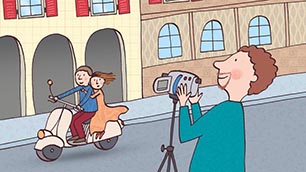| Silvia: | Facciamo due chiacchiere about the espressioni with numeri... |
| Connor: | I’m sorry? |
| Silvia: | Fare due chiacchiere means let’s chat a bit. |
| Connor: | Why due? |
| Silvia: | That’s because of the Briscola! Do you know the rules of the Italian card game named Briscola? |
| Connor: | Nonno Giovanni e zio Luciano, his son, my zio, play that game all the time! They talk in a voce alta... They once had un litigio so loud that I thought the casa would collapse! |
| Silvia: | I can imagine! So, in this Briscola game the due di picche è the lowest-point card, it really counts for nothing. Hence, due è sinonimo for a very small quantity. |
| Connor: | Right! I remember nonno Giovanni saying “il due di picche mi ha dato!”, which... I figured… something was wrong... |
| Silvia: | Connor. Sì, completely wrong. Dare il due di picche, which could be translated literally as “to give the two of spades” has also another meaning, by the way. It is an informal expression that means “to not accept somebody’s romantic advances”! |
| Connor: | Veramente? |
| Silvia: | Sì, è un’espressione molto comune in Italia. |
| Connor: | Well, I hope I won’t experience that! |
| Silvia: | Ci sono molte espressioni idiomatiche italiane con i numeri... did you know that? |
| Connor: | No, I didn’t, but I always wondered why you say “grazie mille!”. |
| Silvia: | Well, grazie mille means “thank you very much” or “thanks a lot”. It traces back to un fatto storico. As you may know, Giuseppe Garibaldi began the process of Italian unificazione by landing in Marsala, Sicily, l’11 maggio 1860. Along with him went a small esercito of mille uomini, a thousand men. As soon as they got ashore, he said “Grazie, Mille!” Hence, the current expression grazie mille. |
| Connor: | È molto interessante, no? |
| Silvia: | Giusto! |
| Connor: | Grazie mille, Silvia! Facc.. how did you say to chat a bit? |
| Silvia: | Facciamo due chiacchiere. |
| Connor: | Facciamo due chiacchiere again soon? |
| Silvia: | Sì, but senza dare i numeri! |
| Connor: | Un’altra espressione italiana? |
| Silvia: | Esattamente! |





















